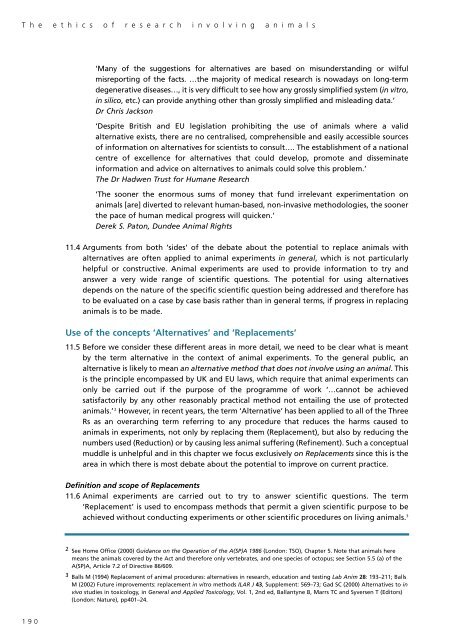The ethics of research involving animals - Nuffield Council on ...
The ethics of research involving animals - Nuffield Council on ...
The ethics of research involving animals - Nuffield Council on ...
Create successful ePaper yourself
Turn your PDF publications into a flip-book with our unique Google optimized e-Paper software.
T h e e t h i c s o f r e s e a r c h i n v o l v i n g a n i m a l s<br />
‘Many <str<strong>on</strong>g>of</str<strong>on</strong>g> the suggesti<strong>on</strong>s for alternatives are based <strong>on</strong> misunderstanding or wilful<br />
misreporting <str<strong>on</strong>g>of</str<strong>on</strong>g> the facts. …the majority <str<strong>on</strong>g>of</str<strong>on</strong>g> medical <str<strong>on</strong>g>research</str<strong>on</strong>g> is nowadays <strong>on</strong> l<strong>on</strong>g-term<br />
degenerative diseases…, it is very difficult to see how any grossly simplified system (in vitro,<br />
in silico, etc.) can provide anything other than grossly simplified and misleading data.’<br />
Dr Chris Jacks<strong>on</strong><br />
‘Despite British and EU legislati<strong>on</strong> prohibiting the use <str<strong>on</strong>g>of</str<strong>on</strong>g> <str<strong>on</strong>g>animals</str<strong>on</strong>g> where a valid<br />
alternative exists, there are no centralised, comprehensible and easily accessible sources<br />
<str<strong>on</strong>g>of</str<strong>on</strong>g> informati<strong>on</strong> <strong>on</strong> alternatives for scientists to c<strong>on</strong>sult…. <str<strong>on</strong>g>The</str<strong>on</strong>g> establishment <str<strong>on</strong>g>of</str<strong>on</strong>g> a nati<strong>on</strong>al<br />
centre <str<strong>on</strong>g>of</str<strong>on</strong>g> excellence for alternatives that could develop, promote and disseminate<br />
informati<strong>on</strong> and advice <strong>on</strong> alternatives to <str<strong>on</strong>g>animals</str<strong>on</strong>g> could solve this problem.’<br />
<str<strong>on</strong>g>The</str<strong>on</strong>g> Dr Hadwen Trust for Humane Research<br />
‘<str<strong>on</strong>g>The</str<strong>on</strong>g> so<strong>on</strong>er the enormous sums <str<strong>on</strong>g>of</str<strong>on</strong>g> m<strong>on</strong>ey that fund irrelevant experimentati<strong>on</strong> <strong>on</strong><br />
<str<strong>on</strong>g>animals</str<strong>on</strong>g> [are] diverted to relevant human-based, n<strong>on</strong>-invasive methodologies, the so<strong>on</strong>er<br />
the pace <str<strong>on</strong>g>of</str<strong>on</strong>g> human medical progress will quicken.’<br />
Derek S. Pat<strong>on</strong>, Dundee Animal Rights<br />
11.4 Arguments from both ‘sides’ <str<strong>on</strong>g>of</str<strong>on</strong>g> the debate about the potential to replace <str<strong>on</strong>g>animals</str<strong>on</strong>g> with<br />
alternatives are <str<strong>on</strong>g>of</str<strong>on</strong>g>ten applied to animal experiments in general, which is not particularly<br />
helpful or c<strong>on</strong>structive. Animal experiments are used to provide informati<strong>on</strong> to try and<br />
answer a very wide range <str<strong>on</strong>g>of</str<strong>on</strong>g> scientific questi<strong>on</strong>s. <str<strong>on</strong>g>The</str<strong>on</strong>g> potential for using alternatives<br />
depends <strong>on</strong> the nature <str<strong>on</strong>g>of</str<strong>on</strong>g> the specific scientific questi<strong>on</strong> being addressed and therefore has<br />
to be evaluated <strong>on</strong> a case by case basis rather than in general terms, if progress in replacing<br />
<str<strong>on</strong>g>animals</str<strong>on</strong>g> is to be made.<br />
Use <str<strong>on</strong>g>of</str<strong>on</strong>g> the c<strong>on</strong>cepts ‘Alternatives’ and ‘Replacements’<br />
11.5 Before we c<strong>on</strong>sider these different areas in more detail, we need to be clear what is meant<br />
by the term alternative in the c<strong>on</strong>text <str<strong>on</strong>g>of</str<strong>on</strong>g> animal experiments. To the general public, an<br />
alternative is likely to mean an alternative method that does not involve using an animal. This<br />
is the principle encompassed by UK and EU laws, which require that animal experiments can<br />
<strong>on</strong>ly be carried out if the purpose <str<strong>on</strong>g>of</str<strong>on</strong>g> the programme <str<strong>on</strong>g>of</str<strong>on</strong>g> work ‘…cannot be achieved<br />
satisfactorily by any other reas<strong>on</strong>ably practical method not entailing the use <str<strong>on</strong>g>of</str<strong>on</strong>g> protected<br />
<str<strong>on</strong>g>animals</str<strong>on</strong>g>.’ 2 However, in recent years, the term ‘Alternative’ has been applied to all <str<strong>on</strong>g>of</str<strong>on</strong>g> the Three<br />
Rs as an overarching term referring to any procedure that reduces the harms caused to<br />
<str<strong>on</strong>g>animals</str<strong>on</strong>g> in experiments, not <strong>on</strong>ly by replacing them (Replacement), but also by reducing the<br />
numbers used (Reducti<strong>on</strong>) or by causing less animal suffering (Refinement). Such a c<strong>on</strong>ceptual<br />
muddle is unhelpful and in this chapter we focus exclusively <strong>on</strong> Replacements since this is the<br />
area in which there is most debate about the potential to improve <strong>on</strong> current practice.<br />
Definiti<strong>on</strong> and scope <str<strong>on</strong>g>of</str<strong>on</strong>g> Replacements<br />
11.6 Animal experiments are carried out to try to answer scientific questi<strong>on</strong>s. <str<strong>on</strong>g>The</str<strong>on</strong>g> term<br />
‘Replacement’ is used to encompass methods that permit a given scientific purpose to be<br />
achieved without c<strong>on</strong>ducting experiments or other scientific procedures <strong>on</strong> living <str<strong>on</strong>g>animals</str<strong>on</strong>g>. 3<br />
2 See Home Office (2000) Guidance <strong>on</strong> the Operati<strong>on</strong> <str<strong>on</strong>g>of</str<strong>on</strong>g> the A(SP)A 1986 (L<strong>on</strong>d<strong>on</strong>: TSO), Chapter 5. Note that <str<strong>on</strong>g>animals</str<strong>on</strong>g> here<br />
means the <str<strong>on</strong>g>animals</str<strong>on</strong>g> covered by the Act and therefore <strong>on</strong>ly vertebrates, and <strong>on</strong>e species <str<strong>on</strong>g>of</str<strong>on</strong>g> octopus; see Secti<strong>on</strong> 5.5 (a) <str<strong>on</strong>g>of</str<strong>on</strong>g> the<br />
A(SP)A, Article 7.2 <str<strong>on</strong>g>of</str<strong>on</strong>g> Directive 86/609.<br />
3 Balls M (1994) Replacement <str<strong>on</strong>g>of</str<strong>on</strong>g> animal procedures: alternatives in <str<strong>on</strong>g>research</str<strong>on</strong>g>, educati<strong>on</strong> and testing Lab Anim 28: 193–211; Balls<br />
M (2002) Future improvements: replacement in vitro methods ILAR J 43, Supplement: 569–73; Gad SC (2000) Alternatives to in<br />
vivo studies in toxicology, in General and Applied Toxicology, Vol. 1, 2nd ed, Ballantyne B, Marrs TC and Syversen T (Editors)<br />
(L<strong>on</strong>d<strong>on</strong>: Nature), pp401–24.<br />
190
















